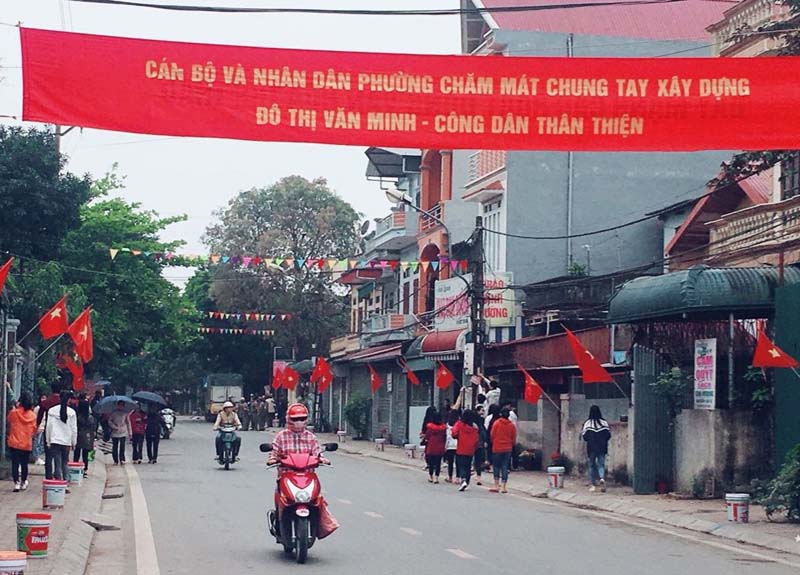
(HBO) - Towards the goal of building Hoa Binh City into a civilized and modern city imbued with a cultural identity of Hoa Binh, the Party Committee and the city government have directed the departments, the units and the enterprises throughout to seriously implement the movement "All people unite to build a cultural life”.

The streets in the Cham Ward (now Dan Chu
Ward – Hoa Binh City) are decorated in response to the movement of building the
civilized urban area.
Accordingly, the movement of emulation
towards a bright - green - clean - beautiful urban area has also been
effectively implemented by the city. The activities such as the Green Saturday,
the autonomous road, the civilized streets, the garbage-free residential areas,
the green Sunday... have been responded by the departments, the units and the
local people and have been effectively implemented in the residential areas.
Currently, 100% of wards and communes have implemented the green Saturday.
There are nearly 100 routes which have been self-governed by the young and
women. 100% of the schools in the area have built the cultural school gates...
Currently, the city is continuing to expand the model of "civilized streets and
the residential areas without garbage”. Thereby, the rate of the population
providing garbage collection and treatment services has reached 95% and the
proportion of medical waste treated in the locality has reached 100%.
In order to encourage and promote the
movement "All people unite to build a cultural life,” at the end of January
2020, the People's Committee of the City issued the Decision No.89/QD-UBND to
recognize the title "The departments, the units and the enterprises reaching
the cultural standards” in 2019. Accordingly, 215 departments, units and
enterprises in the city were recognized to meet the standards of cultural
departments, units and enterprises.
The People’s Committee of Lac Son district held a ceremony on April 28 to receive the provincial relic certificate for the ancient rock carving site at Suoi Co stream, located in My Thanh commune.
A special music show titled "The country is in the fullness of joy” has been held at Hoa Binh Square in Hoa Binh city in celebration of the 50th anniversary of the liberation of the South and national reunification (April 30, 1975–2025).
The People's Committee of Lo Son commune, Tan Lac district, has organised the local annual traditional stream fishing festival on April 19 - 20.
As a land deeply intertwined with human history and Vietnam’s millennia-long journey of nation-building and defence, Hoa Binh is often revered for its epic tales and legends.
Residents of Hoa Binh boast a rich cultural identity, reflected in their unique language, traditional attire, customs, and folk melodies – described as "sweet as honey, clear as a mountain stream.”
Lac Son district’s Vu ban town held the 2025 Truong Kha temple festival on April 12–13 (the 15th–16th days of the third lunar month). Since its revival in 2019, the festival has been organised every three years, preserving valuable intangible heritage while meeting the community’s cultural and spiritual needs.



